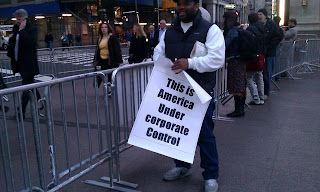The opinion editorial below ran on the
Huffington Post and
The Hill yesterday.
-------------------------------------------------------------------------------------------------
We Didn't Vote for This
by Frank Knapp, Jr.
Whether Americans voted for Republicans or Democrats in the mid-term election, one thing is clear: Voters were demanding that Congress focus intensively on job creation on Main Street -- not lobbyists and campaign donors from big business and Wall Street.
Apparently, many in Congress and President Obama, if recent reports are true, either didn't get the message or simply don't care now that the voting is over.
The top legislative priority of the newly "Tea Party-empowered" during the lame duck session is hardly what Tea Party insurgents had in mind. The proposal is to (1) increase the national debt by borrowing $700 billion to $1 trillion over the next 10 years; (2) spend the money on big, non-job producing tax cuts for the wealthiest 2 percent of Americans; (3) use small business as the excuse.
This bad-business proposal is now being pushed in Congress and the media by those advocating extending the Bush-era tax cuts to the top two income brackets. While proponents acknowledge that less than 3 percent of the taxpayers who would receive the tax cuts actually have some business income, they insist that these approximately 900,000 taxpayers are the very successful small business owners who will stop hiring and purchasing if they don't get their tax cut. Wrong, wrong, wrong.
First, almost all real small business owners are middle-class Americans with middle-class incomes. Walk down any Main Street and you won't find small business owners netting over $250,000 a year in profit (dollars remaining after the cost of employee wages and other business expenses are deducted from taxable income).
These middle-income, Main Street small businesses are the ones we really need to help create the new jobs to lift us out of this down economy There is absolutely no evidence that the wealthiest small business owners create more jobs than those in any other tax brackets. As any small business owner knows, the number of employees does not correlate with profit.
So who are these mysterious high-income "small business" taxpayers in the top two brackets who Congress is considering borrowing hundreds of billions from foreign countries in order to give a tax cut?
Very few of them are what most would consider small business owners. They include partners in large corporate law firms, hedge fund managers, K Street lobbyists, high-powered consultants, Wall Street bond traders and the country's wealthiest millionaires -- all of whom claim some business income and thus are counted in IRS eyes as small businesses. These aren't "mom and pop" businesses, says Adam Looney, senior fellow at the Brookings Institution.
Not only are the vast majority of these 900,000 "faux" small business taxpayers not involved in job hiring decisions, the tax cut won't even cause them to significantly increase their personal spending to create the demand for new jobs.
The non-partisan Congressional Budget Office (CBO) evaluated 11 policy options in terms of boosting economic growth and creating jobs. It found that "policies that would temporarily increase the after-tax income of people with relatively high income... would have smaller effects because such tax cuts would probably not affect the recipients' spending significantly."
The wealthiest American's are more likely to save their money from a tax cut rather than spend it, according to Moody's Analytics, Inc.
If we really want to give a tax cut that will create jobs, then we could cut employer payroll taxes on businesses that actually increase their workforce. The CBO estimates this would have six to eight times as much job-creating impact as an income tax cut.
Alternatively we could create more customers for our small businesses through infrastructure projects, many of them long overdue upkeep or modernization, or keeping teachers and law enforcement officers working rather than laid off. The policy the CBO found with the biggest bang for the buck is extending unemployment insurance -- a direct infusion of money into local economies by people buying for their basic needs.
Increasing the nation's deficit while not saving or creating jobs is just more politics as usual in Washington where those with the most money get rewarded with even more money.
Congress needs to hear this loud and clear. These high-end tax cuts serve K Street lobbyists not Main Street shop owners. Politicians should not use us to justify a very bad business decision.
+(124x76).jpg)







